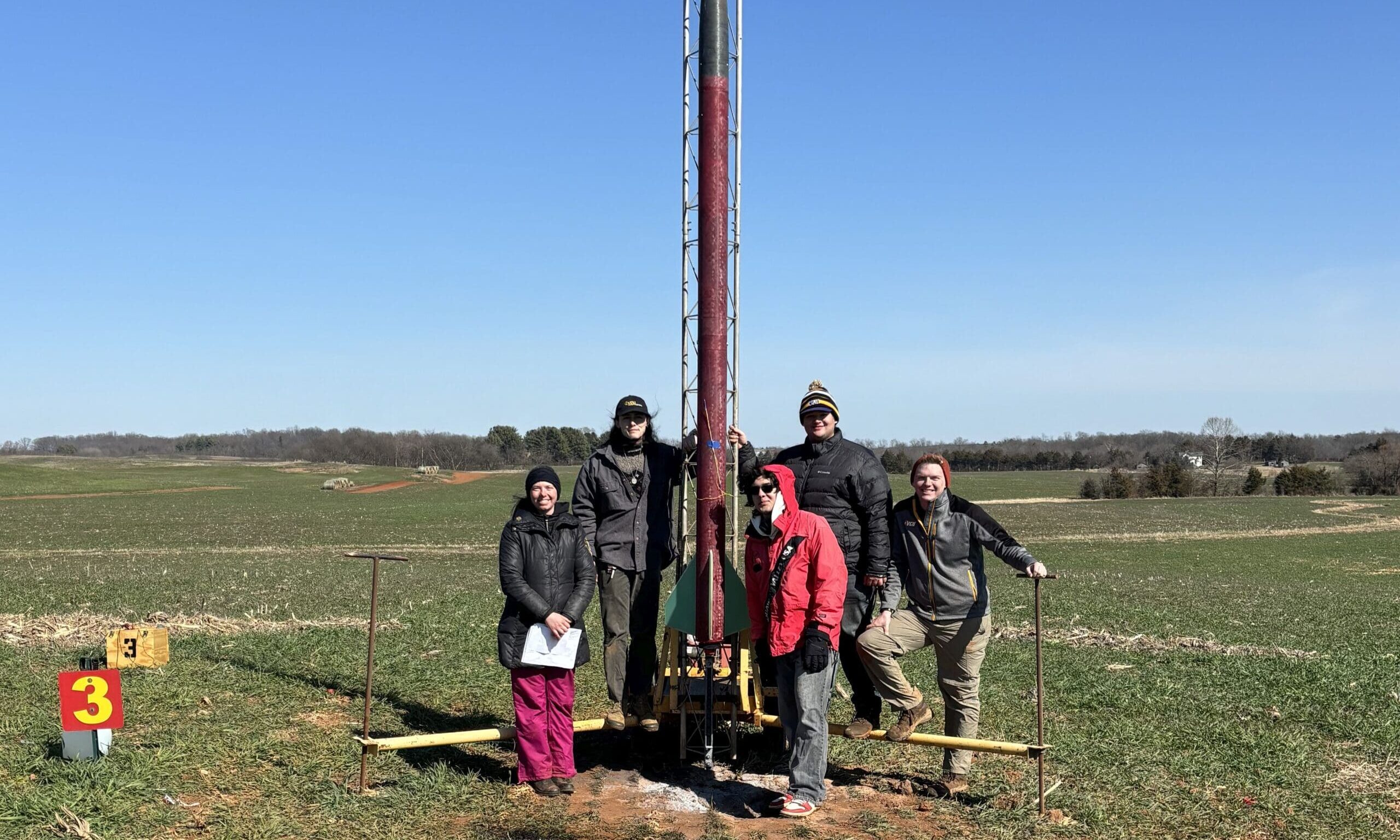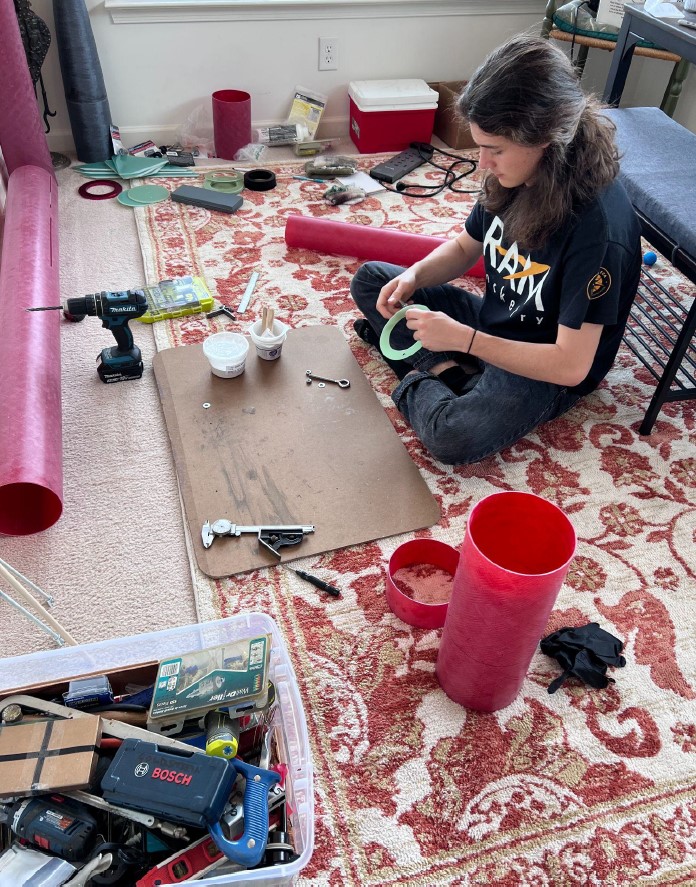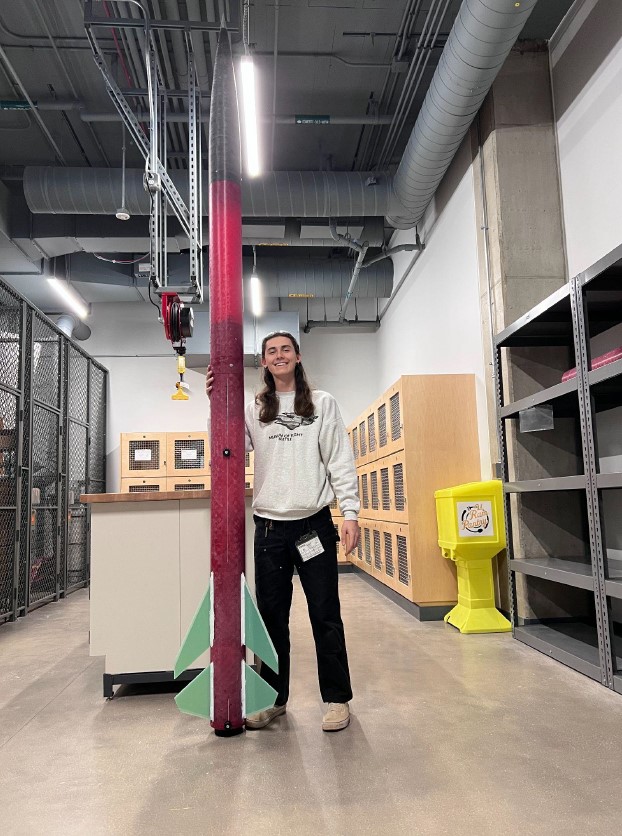From classroom to the cosmos: Mechanical engineering senior achieves national high-power rocketry certification

After earning his level three certification from the Tripoli Rocketry Association, Thomas Goldstein and his fellow Ram Rocketry members are headed to the big leagues – The Spaceport America Cup.
From its inception as a club only three years ago to competing in the highly prestigious Spaceport America Cup this June, Ram Rocketry has been exceeding expectations since their modest beginning.
Ram Rocketry is a student-led organization within the VCU College of Engineering, introducing students to the aerospace industry through the research, design and building of competition rockets. As stated on their website, Ram Rocketry’s mission is to “mentor the engineers of tomorrow and answer the call of the burgeoning aerospace industry.”
Despite being a relatively new organization, Ram Rocketry has quickly become one of the most popular engineering student groups with over 30 active members. Nearly all of the group’s members are pursuing rocketry certifications through the Tripoli Rocketry Association, a non-profit organization working to enhance the safety and education of high-powered rocketry across the globe.
By the end of this year’s launch season, over twenty students will have earned their level one certification, over ten students their level two certification and two students their level three. Of over 8,300 members of Tripoli nationwide, only around 1,200 have achieved a level three certification.
Thomas Goldstein, a VCU Engineering student majoring in mechanical engineering, is one of these few.
“The whole process took around 250-300 hours of work,” Goldstein said. “From meticulous construction to rigorous testing, every step demanded precision and perseverance. Typically, level threes are pursued by older hobbyists and can take months to years to complete.”
From statics to thermodynamics and mechanical systems design, Goldstein uses skills learned in his engineering courses in nearly every aspect of rocketry.
“We use classroom concepts to calculate pressure holes for rocket sections, tensile strengths of integral bolts, shear strengths for epoxy joints, and so many more applied situations,” Goldstein said. “One of the most important subjects, especially to those of us pursuing level threes, is materials science. It is applied absolutely everywhere; it explains why we add milled glass fiber to our epoxied joints, why epoxy heats as it cures, why we can’t use steel or PVC in certain motor sections, why our bolts need to be stainless in certain sections and even why different parts of the rocket are the material they are.”
After a year of technical challenges, perseverance, and a 12-foot-long rocket taking shape in his dad’s living room, Goldstein earned his level three certification this February.

“It was sometimes hard to stay motivated while balancing a full course load, competition rocket work, my senior design project and keeping a social life,” Goldstein said. “But the infinite support of fellow club members, especially Ishaan Thakur who was pursuing his level three alongside me, pushed me through to the finish line.”
In addition to the support from his peers, Goldstein emphasized the dedication of the club’s faculty advisor, Robert Klenke, Ph.D., whose expertise has been instrumental in building the club to what it is today.
As the semester comes to a close, Ram Rocketry is going full throttle as they prepare to compete in the Spaceport America Cup, the world’s largest intercollegiate rocket engineering competition. The competition requires students to launch their rocket to 10,000 feet, along with several design reviews and a comprehensive presentation throughout the competition week. Ram Rocketry will be among 130 teams from universities all over the world.

“The team just successfully flew and recovered our competition rocket on its maiden voyage,” Goldstein said. “It was an all-day effort, but we learned so much, and we now know exactly what needs to be tweaked and fine-tuned to hit that 10,000-foot goal.”
Once the final adjustments are made, the club plans to give the rocket a black-and-gold makeover, excited to showcase the VCU College of Engineering at new heights.
In addition to being an equally fun and educational extracurricular, Goldstein emphasizes how influential his work in Ram Rocketry has been in his career readiness.
“Getting a job in the aerospace industry is very competitive,” Goldstein said. “But I ended up getting hired almost solely off my work with Ram Rocketry for both my internship and full-time job.”
With their exceptional growth in such a short time, Ram Rocketry is establishing VCU as a front runner in student rocketry groups and aerospace engineering education programs.
The VCU College of Engineering offers innovative undergraduate and graduate degree programs tailored to meet the demands of the rapidly evolving engineering field. As part of a premier research university, students are given the opportunity to perform real-world research in our state-of-the-art facilities as soon as they enroll. Browse videos and recent news to discover how the College of Engineering at Virginia Commonwealth University prepares the next generation of scientists and engineers for the challenges of the future.
Categories General College, Mechanical & Nuclear Engineering, Student Stories, Undergraduate Student Stories